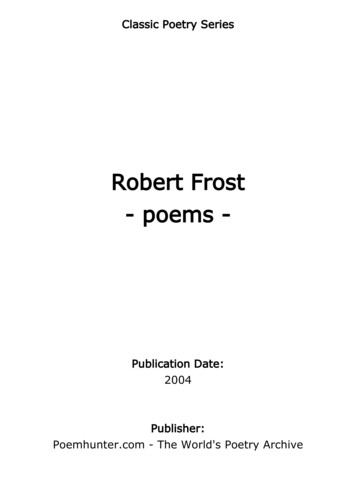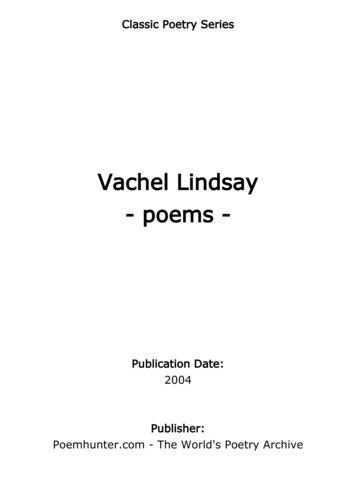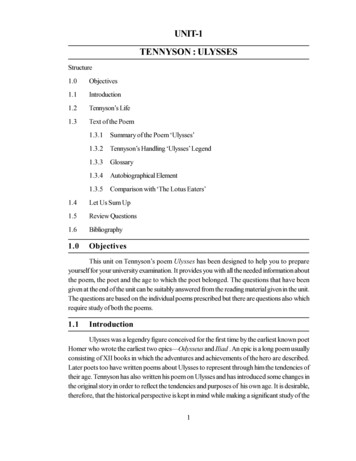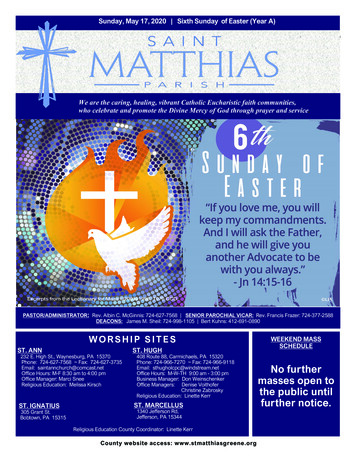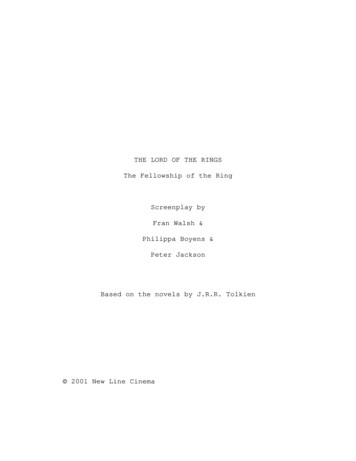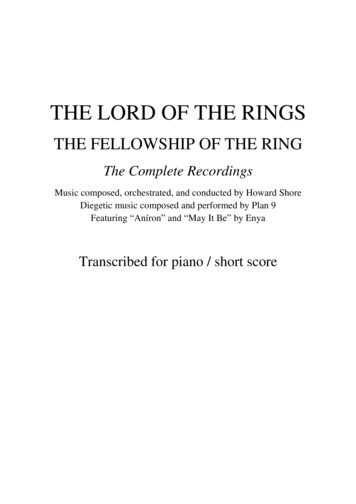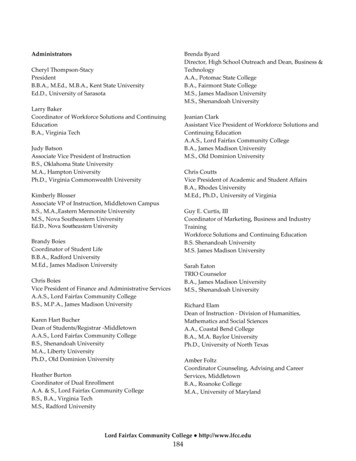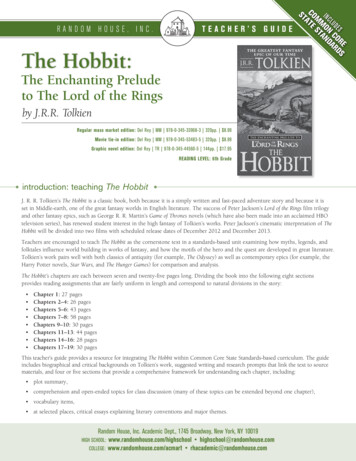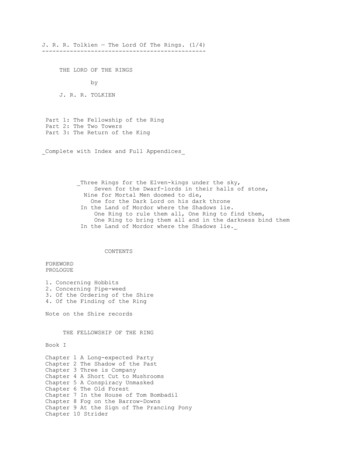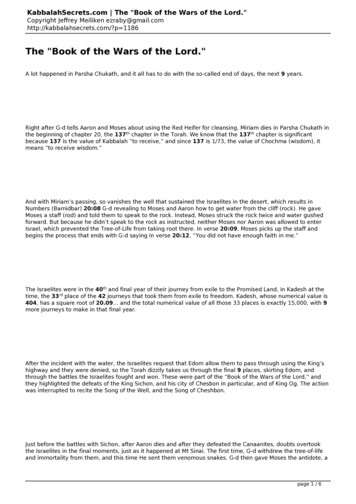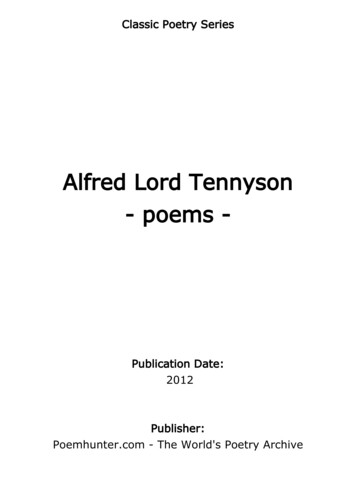
Transcription
Classic Poetry SeriesAlfred Lord Tennyson- poems -Publication Date:2012Publisher:Poemhunter.com - The World's Poetry Archive
Alfred Lord Tennyson(6 August 1809 – 6 October1892)Alfred Tennyson, 1st Baron Tennyson, FRS was Poet Laureate of the UnitedKingdom during much of Queen Victoria's reign and remains one of the mostpopular poets in the English language.Tennyson excelled at penning short lyrics, such as "In the Valley of Cauteretz","Break, Break, Break", "The Charge of the Light Brigade", "Tears, Idle Tears" and"Crossing the Bar". Much of his verse was based on classical mythologicalthemes, such as Ulysses, although In Memoriam A.H.H. was written tocommemorate his best friend Arthur Hallam, a fellow poet and fellow student atTrinity College, Cambridge, who was engaged to Tennyson's sister, but died froma brain haemorrhage before they could marry. Tennyson also wrote some notableblank verse including Idylls of the King, "Ulysses," and "Tithonus." During hiscareer, Tennyson attempted drama, but his plays enjoyed little success.A number of phrases from Tennyson's work have become commonplaces of theEnglish language, including "Nature, red in tooth and claw", "'Tis better to haveloved and lost / Than never to have loved at all", "Theirs not to reason why, /Theirs but to do and die", "My strength is as the strength of ten, / Because myheart is pure", "Knowledge comes, but Wisdom lingers", and "The old orderchangeth, yielding place to new". He is the ninth most frequently quoted writer inThe Oxford Dictionary of Quotations. b Early Life /b Tennyson was born in Somersby, Lincolnshire, a rector's son and fourth of 12children. He derived from a middle-class line of Tennysons, but also had nobleand royal ancestry.His father, George Clayton Tennyson (1778–1831), was rector of Somersby(1807–1831), also rector of Benniworth and Bag Enderby, and vicar of Grimsby(1815). The rector was the elder of two sons, but was disinherited at an earlyage by his father, the landowner George Tennyson (1750–1835) (owner ofBayons Manor and Usselby Hall), in favour of his younger brother Charles, wholater took the name Charles Tennyson d'Eyncourt. Rev. George Clayton Tennysonraised a large family and "was a man of superior abilities and varied attainments,who tried his hand with fair success in architecture, painting, music, and poetry.He was comfortably well off for a country clergyman and his shrewd moneywww.PoemHunter.com - The World's Poetry Archive1
management enabled the family to spend summers at Mablethorpe andSkegness, on the eastern coast of England." Alfred Tennyson's mother, ElizabethFytche (1781–1865), was the daughter of Stephen Fytche (1734–1799), vicar ofSt. James Church, Louth (1764) and rector of Withcall (1780), a small villagebetween Horncastle and Louth. Tennyson's father "carefully attended to theeducation and training of his children."Tennyson and two of his elder brothers were writing poetry in their teens, and acollection of poems by all three were published locally when Alfred was only 17.One of those brothers, Charles Tennyson Turner later married Louisa Sellwood,the younger sister of Alfred's future wife; the other was Frederick Tennyson.Another of Tennyson's brothers, Edward Tennyson, was institutionalised at aprivate asylum, where he died. b Education and First Publication /b Tennyson was first a student of Louth Grammar School for four years(1816–1820) and then attended Scaitcliffe School, Englefield Green and KingEdward VI Grammar School, Louth. He entered Trinity College, Cambridge in1827,[4] where he joined a secret society called the Cambridge Apostles. AtCambridge Tennyson met Arthur Henry Hallam, who became his closest friend.His first publication was a collection of "his boyish rhymes and those of his elderbrother Charles" entitled Poems by Two Brothers published in 1827.In 1829 he was awarded the Chancellor's Gold Medal at Cambridge for one of hisfirst pieces, "Timbuctoo." Reportedly, "it was thought to be no slight honour for ayoung man of twenty to win the chancellor's gold medal."He published his firstsolo collection of poems, Poems Chiefly Lyrical in 1830. "Claribel" and "Mariana",which later took their place among Tennyson's most celebrated poems, wereincluded in this volume. Although decried by some critics as overly sentimental,his verse soon proved popular and brought Tennyson to the attention of wellknown writers of the day, including Samuel Taylor Coleridge. b Return to Lincolnshire and Second Publication /b In the spring of 1831 Tennyson's father died, requiring him to leave Cambridgebefore taking his degree. He returned to the rectory, where he was permitted tolive for another six years, and shared responsibility for his widowed mother andthe family. Arthur Hallam came to stay with his family during the summer andbecame engaged to Tennyson's sister, Emilia Tennyson.In 1833, Tennyson published his second book of poetry, which included his well-www.PoemHunter.com - The World's Poetry Archive2
known poem, The Lady of Shalott. The volume met heavy criticism, which sodiscouraged Tennyson that he did not publish again for 10 years, although hecontinued to write. That same year, Hallam died suddenly and unexpectedly aftersuffering a cerebral haemorrhage while on vacation in Vienna. Hallam's suddenand unexpected death in 1833 had a profound impact on Tennyson, and inspiredseveral masterpieces, including "In the Valley of Cauteretz" and In MemoriamA.H.H., a long poem detailing the 'Way of the Soul'.Tennyson and his family were allowed to stay in the rectory for some time, butlater moved to High Beach, Essex in 1837. An unwise investment in anecclesiastical wood-carving enterprise soon led to the loss of much of the familyfortune. Tennyson then moved to London, and lived for a time at Chapel House,Twickenham. b Third Publication /b In 1842, while living modestly in London, Tennyson published two volumes ofPoems, of which the first included works already published and the second wasmade up almost entirely of new poems. They met with immediate success.Poems from this collection, such as Locksley Hall, "Tithonus", and "Ulysses" havemet enduring fame. The Princess: A Medley, a satire on women's education,which came out in 1847, was also popular for its lyrics. W. S. Gilbert lateradapted and parodied the piece twice: in The Princess (1870) and in Princess Ida(1884).It was in 1850 that Tennyson reached the pinnacle of his career, finallypublishing his masterpiece, In Memoriam A.H.H., dedicated to Hallam. Later thesame year he was appointed Poet Laureate, succeeding a href " b Poet Laureate /b After a href "Queen Victoria was an ardent admirer of Tennyson's work, and in 1884 createdhim Baron Tennyson, of Aldworth in the County of Sussex and of Freshwater inthe Isle of Wight. Tennyson initially declined a baronetcy in 1865 and 1868(when tendered by Disraeli), finally accepting a peerage in 1883 at Gladstone'searnest solicitation. He took his seat in the House of Lords on 11 March 1884.Tennyson also wrote a substantial quantity of non-official political verse, from thebellicose "Form, Riflemen, Form", on the French crisis of 1859, to "Steersman, benot precipitate in thine act/of steering", deploring Gladstone's Home Rule Bill.www.PoemHunter.com - The World's Poetry Archive3
Tennyson was the first to be raised to a British Peerage for his writing. Apassionate man with some peculiarities of nature, he was never particularlycomfortable as a peer, and it is widely held that he took the peerage in order tosecure a future for his son Hallam.Thomas Edison made sound recordings of Tennyson reading his own poetry, latein his life. They include recordings of The Charge of the Light Brigade, andexcerpts from "The splendour falls" (from The Princess), "Come into the garden"(from Maud), "Ask me no more", "Ode on the death of the Duke of Wellington","Charge of the Heavy Brigade", and "Lancelot and Elaine"; the sound quality is aspoor as wax cylinder recordings usually are.Towards the end of his life Tennyson revealed that his "religious beliefs alsodefied convention, leaning towards agnosticism and pandeism": Famously, hewrote in In Memoriam: "There lives more faith in honest doubt, believe me, thanin half the creeds." [The context directly contradicts the apparent meaning of thisquote.] In Maud, 1855, he wrote: "The churches have killed their Christ." In"Locksley Hall Sixty Years After," Tennyson wrote: "Christian love among thechurches look'd the twin of heathen hate." In his play, Becket, he wrote: "We areself-uncertain creatures, and we may, Yea, even when we know not, mix ourspites and private hates with our defence of Heaven." Tennyson recorded in hisDiary (p. 127): "I believe in Pantheism of a sort." His son's biography confirmsthat Tennyson was not an orthodox Christian, noting that Tennyson praisedGiordano Bruno and Spinoza on his deathbed, saying of Bruno, "His view of Godis in some ways mine," in 1892.Tennyson continued writing into his eighties. He died on 6 October 1892 atAldworth, aged 83. He was buried at Westminster Abbey. A memorial waserected in All Saints' Church, Freshwater. His last words were; "Oh that press willhave me now!".He was succeeded as 2nd Baron Tennyson by his son, Hallam, who produced anauthorised biography of his father in 1897, and was later the second GovernorGeneral of Australia. b The art of Tennyson's Poetry /b Tennyson used a wide range of subject matter, ranging from medieval legends toclassical myths and from domestic situations to observations of nature, as sourcematerial for his poetry. The influence of a href "www.PoemHunter.com - The World's Poetry Archive4
The moan of doves in immemorial elmsAnd murmuring of innumerable bees.Tennyson was a craftsman who polished and revised his manuscripts extensively.Few poets have used such a variety of styles with such an exact understanding ofmetre; like many Victorian poets, he experimented in adapting the quantitativemetres of Greek and Latin poetry to English. He reflects the Victorian period ofhis maturity in his feeling for order and his tendency towards moralising and selfindulgent melancholy. He also reflects a concern common among Victorianwriters in being troubled by the conflict between religious faith and expandingscientific knowledge. Like many writers who write a great deal over a long time,he can be pompous or banal, but his personality rings throughout all his works –work that reflects a grand and special variability in its quality. Tennysonpossessed the strongest poetic power; he put great length into many works,most famous of which are Maud and Idylls of the King, the latter one ofliterature's treatments of the legend of King Arthur and The Knights of the RoundTable.www.PoemHunter.com - The World's Poetry Archive5
ŒNoneThere lies a vale in Ida, lovelierThan all the valleys of Ionian hills.The swimming vapour slopes athwart the glen,Puts forth an arm, and creeps from pine to pine,And loiters, slowly drawn. On either handThe lawns and meadow-ledges midway downHang rich in flowers, and far below them roarsThe long brook falling thro' the clov'n ravineIn cataract after cataract to the sea.Behind the valley topmost GargarusStands up and takes the morning: but in frontThe gorges, opening wide apart, revealTroas and Ilion's column'd citadel,The crown of Troas.Hither came at noonMournful Œnone, wandering forlornOf Paris, once her playmate on the hills.Her cheek had lost the rose, and round her neckFloated her hair or seem'd to float in rest.She, leaning on a fragment twined with vine,Sang to the stillness, till the mountain-shadeSloped downward to her seat from the upper cliff."O mother Ida, many-fountain'd Ida,Dear mother Ida, harken ere I die.For now the noonday quiet holds the hill:The grasshopper is silent in the grass:The lizard, with his shadow on the stone,Rests like a shadow, and the winds are dead.The purple flower droops: the golden beeIs lily-cradled: I alone awake.My eyes are full of tears, my heart of love,My heart is breaking, and my eyes are dim,And I am all aweary of my life."O mother Ida, many-fountain'd Ida,Dear mother Ida, harken ere I die.Hear me, O Earth, hear me, O Hills, O CavesThat house the cold crown'd snake! O mountain brooks,I am the daughter of a River-God,www.PoemHunter.com - The World's Poetry Archive6
Hear me, for I will speak, and build up allMy sorrow with my song, as yonder wallsRose slowly to a music slowly breathed,A cloud that gather'd shape: for it may beThat, while I speak of it, a little whileMy heart may wander from its deeper woe."O mother Ida, many-fountain'd Ida,Dear mother Ida, harken ere I die.I waited underneath the dawning hills,Aloft the mountain lawn was dewy-dark,And dewy-dark aloft the mountain pine:Beautiful Paris, evil-hearted Paris,Leading a jet-black goat white-horn'd, white-hooved,Came up from reedy Simois all alone."O mother Ida, harken ere I die.Far-off the torrent call'd me from the cleft:Far up the solitary morning smoteThe streaks of virgin snow. With down-dropt eyesI sat alone: white-breasted like a starFronting the dawn he moved; a leopard skinDroop'd from his shoulder, but his sunny hairCluster'd about his temples like a God's:And his cheek brighten'd as the foam-bow brightensWhen the wind blows the foam, and all my heartWent forth to embrace him coming ere he came."Dear mother Ida, harken ere I die.He smiled, and opening out his milk-white palmDisclosed a fruit of pure Hesperian gold,That smelt ambrosially, and while I look'dAnd listen'd, the full-flowing river of speechCame down upon my heart. My own Œnone,Beautiful-brow'd Œnone, my own soul,Behold this fruit, whose gleaming rind ingrav'n"For the most fair," would seem to award it thine,As lovelier than whatever Oread hauntThe knolls of Ida, loveliest in all graceOf movement, and the charm of married brows.'"Dear mother Ida, harken ere I die.www.PoemHunter.com - The World's
known poem, The Lady of Shalott. The volume met heavy criticism, which so discouraged Tennyson that he did not publish again for 10 years, although he continued to write. That same year, Hallam died suddenly and unexpectedly after suffering a cerebral haemorrhage while on vacation in Vienna. Hallam's sudden and unexpected death in 1833 had a profound impact on Tennyson, and inspired several .File Size: 1MBPage Count: 875
